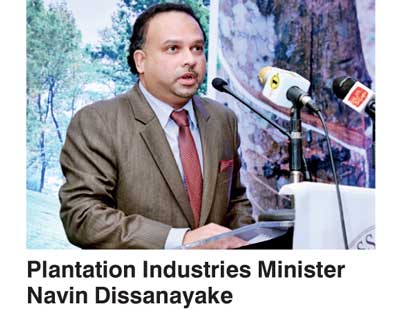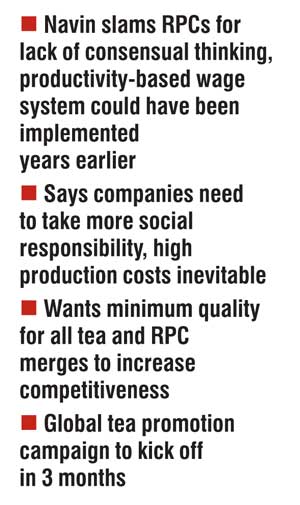Thursday Feb 19, 2026
Thursday Feb 19, 2026
Monday, 19 September 2016 00:01 - - {{hitsCtrl.values.hits}}
 By Devin Jayasundera
By Devin Jayasundera
Showing signs of a battle brewing between the Government and plantation companies, Plantation Industries Minister Naveen Dissanayake recently strung out private sector players for failing to push earlier for a productivity-based wage plan, improve standards and suggested mergers for competition.
Dissanayake took a hard-line stance in criticising the lack of forward thinking and insight of Regional Plantation Companies (RPCs) of the Planters’ Association of Ceylon for the plethora of problems that has crippled the industry when he addressed stakeholders at the Annual General Meeting (AGM) on Thursday.
Referring to the ongoing dreadlock between the Planters Association and trade unions in implementing the much-needed productivity-based wage model, Dissanayake said: “Today when you are negotiating with the trade unions you have come to a position of saying ‘we don’t want anything other than the productivity-based wage model’. But two years ago when the same negotiations happened, were you like that?”
“When the prices were high you go along. But when the prices are low, there’s a productivity-based wage model coming in. Just as  much as trade unions are responsible RPCs, should also take some responsibility,” Dissanayake added.
much as trade unions are responsible RPCs, should also take some responsibility,” Dissanayake added.
He indicated that if the planters had adopted a much stronger position, such payment systems could have been implemented at the growth stage of the industry.
Commenting on the recently-resolved scuffle between the Ministry of Finance and the Tea Board over the funds accumulated through the tea promotion and marketing levy, Dissanayake said: “These are your (exporters’) funds and they belong to the tea industry. I will always fight for what you and the industry should have. I will always be the voice of the industry.”
He added that with the help of the fund the long overdue global tea promotion campaign would be launched in the next two to three months.
“There is a certain amount of lethargy in this industry,” lamented Dissanayake. “Should we continue to position tea as simply ‘tea’ or as a premium global beverage? I don’t see that kind of consensual thinking and intellectualising in the industry.”
To overcome the current challenges the industry is facing, Dissanayake suggested it would be beneficial for some RPCs to merge to better exploit global opportunities.
Riddled with deep-rooted socio-economic problems, the estate sector still lags behind on majority of Human Development Indicators (HDI) compared to the rest of the country. The 2012 Human Development Report points out that HDI are lowest in Nuwara Eliya and Badulla, which comprise almost 72% of the total estate population of the country.
Plantation companies have been at the crux of the criticism and often blamed for the weak welfare facilitation of estate workers. RPCs of the Planters’ Association have continually defended that in the post-privatisation environment, quality of life and health indicators of workers have significantly improved, especially in reference to the infant mortality rate of 29 in 1991 which dropped to 9.4 by 2012 and the maternal mortality rate of 18 in 1990 which declined to 2.2 in 2008.
Dissanayake, who is also the Parliamentarian for Nuwara Eliya, reminded that his district has the highest malnutrition for children under five years old. He implied that such cherry picking of statistics could convey a rosier picture that is far different from the ground reality of the estate population.
The surging cost of production is another addition to the Planters’ Association’s list of problems. However, with the country’s economy advancing towards upper middle income status with relatively low income inequality compared to its regional counterparts, production costs in comparison with India and Kenya is superfluous, pointed out Dissanayake.
The Government’s decision to ban the weedicide glyphosate has caused a severe blow to the plantation industry, specifically tea, acknowledged Dissanayake. Several rounds of discussions have been held with top officials including President Sirisena and anti-glyphosate activists, he said, with the intention of allowing a limited amount of weedicide back into Sri Lanka but under stronger monitoring.
The Minister expressed confidence of the policy being accepted but failed to give a timeline.